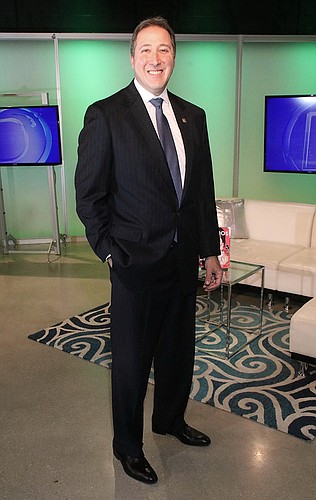Executive Summary
Company. Fifth Third Bancorp Industry. Banking Key. Fifth Third Bancorp seeks to capture more of the Florida market.
Greg Carmichael took a somewhat unconventional route into banking.
Before joining Cincinnati-based Fifth Third Bancorp in June 2003, Carmichael served as vice president and chief information officer with Emerson Electric. And, he's held several IT and leadership assignments for General Electric.
But given the growing importance of technology in banking, Carmichael rose through Fifth Third's ranks following his appointment in 2003 as executive vice president and chief information officer. In 2012, he became president, and in 2015 he was named CEO of the financial institution that has $143 billion in assets, about 18,000 employees and 1,191 branches across 10 states, including Florida.
The Business Observer caught up with Carmichael recently when he visited Fifth Third's Southwest Florida operations.
What is your outlook on Florida's economy?
First off, this is one of our premier growth markets. We're here because of the opportunity to serve the customers in the state of Florida, both commercial and consumer. It's a growth state as we all know. This market has done a really nice job from a recovery perspective. We're seeing single-family homes very robust, pricing very stable, almost back to pre-crisis levels.
What is your perspective on commercial real estate in Florida?
We're very bullish on commercial real estate in this market. When we think about the opportunities in this market, we're focused on the industrial sector. Office space and retail space are all very robust, where you have a good balance of supply and demand. The area we're probably more concerned about right now, given where we are in the credit cycle, is multifamily, especially in coastal areas where wages haven't stayed in lockstep with rents. It's gotten a little overheated, so we're cautious there.
Are there some areas of the state where you'd like to have a stronger presence?
We look at markets like Jacksonville, parts of Tampa and Fort Lauderdale. Those are areas if we were going to do additional expansion, at the right time for the right opportunity, those are areas where we'd like to be more relevant.
Would you do that through acquisitions?
There are various ways you can do that. Organic growth would be one, especially if we already have a reasonable presence. But at some point, if there were bank opportunities that might emerge, we might consider those for the right economics. We'd be opportunistic if it made sense for our shareholders.
What is your perspective on branch banking, and how do you grow your business with fewer branches?
First off, branches are still very important and very relevant. We need branches. But what's changing is the shift in the way our consumers want to bank. Of all interactions with consumers, 90% are now going through our digital channels. (And) 60% of all financial transactions — deposits, money movement — are now going through digital channels.
Our customers want to bank anytime, anywhere. With that said, when customers have an issue and they have a complex problem, they want to talk to someone; they want to walk into a banking center. In addition, small businesses need access to a banking center because they have lots of currency, lots of checks. You'll still need a banking center, but you won't need them the size they are today. You'll have more self-serve capabilities, smart ATMs.
In addition to that, you won't need the density, the number of branches that you had in the past. If you think about it, when you go to a branch twice a week you want that branch as close as possible to your house. If you go to that branch once a month, you may be willing to drive an extra half mile to get to it.
Everybody's looking at their branch infrastructure. If you want to be big in a market you have to put branches in. We're not out of the branch-building business.
There's been a lot of publicity about an improved regulatory environment from the Trump administration. What do you anticipate on that front?
The answer is I don't know, and I think that would be a consistent response from most of my peers. What I would tell you is that we're not going to go backwards. A lot of the regulations that emerged under Dodd-Frank are necessary and important. Banks need to make sure they're well-capitalized.
I do think there's opportunity for refinement, for parts of Dodd-Frank to be revisited to make sure that the level of oversight, complexity and expectations are aligned with the risk of that financial institution. We're not a globally systemic bank that creates tremendous risk, yet we're held to the same requirements oftentimes.
Does that mean your customers could benefit from less regulation?
There's absolutely an opportunity to simplify and make it easier for our customers to get access to capital, to do something as simple as get a mortgage. We're hopeful that those things will mature over time in a new administration, but it's way too early to guess what some of that might look like.
What's the company's Project North Star about?
It's a three-year plan that will enable us to become the one bank that people most value and trust. You have to be on sound financial footing. There are financial expectations over the next three years — growing our return on tangible equity, growing our return on assets, becoming more efficient. There are also expectations to make sure we're fully regulatory compliant and a well-run institution.
It's about putting the customer at the center and improving our ability to serve customers, eliminating issues, errors, problems and improving our brand equity. And it's about making sure we are sound with respect to capital, liquidity and that we have a quality balance sheet designed to be good through the various cycles that our economy will go through. Right now, we're at the long end of a recovery, albeit a slow recovery. We're very mindful of where we're at in the credit cycle.
Where are we in the credit cycle?
We're at the end of it. I'm not predicting a recession, of course, but as a banker my job is to manage risk. If you're a historian, you would see seven to eight years is typically when you go back into your next dip. Now I'll tell you the recovery's been different, the recovery's been slower so you haven't had overheated sectors for the most part, so that might change some of the dynamics over that cycle.
What is your interest rate outlook?
Our belief is we won't get three rate moves (this year). I think you may get one or two, and I think they'll be in the later half of the year. And they'll be small 25 basis point moves. Here's the reason why that's important: It only happens if the economy is doing well. It's a vote of confidence for the economy. That means our consumers, our commercial customers, believe the data supports raising rates.
When rates rise, it's going to help all those people who are trying to save get paid higher interest for their deposits.
Fifth Third has embarked on a $30 billion community commitment. What's that about?
We partnered with the National Community Reinvestment Coalition. We have always invested in our communities, but we wanted a larger commitment that focuses on 10 states in markets where we have banking centers. We spent time in six major cities with hundreds of different local organizations, listening to them about their needs and where banks are falling short to serve their communities.
It's really focused on low-to-moderate income inner city areas. It's $11 billion for mortgage lending, $10 billion for small business and $9 billion for community development. This is over a five-year period. We're going to spend an additional $158 million focused on philanthropy, supplier diversity, financial literacy, sponsorships and the things that create a stronger fabric for the communities we serve. We're doing that for one reason: We believe a bank's role and responsibility is not only to educate our consumers so they can make better financial decisions, but also to make sure that we help them be successful in their business ventures.
How much do you plan to spend in Florida and where?
We haven't finished that exercise yet. We have a team that's putting that in place. We hired our president of northern Florida, Brian Lamb, to head up our corporate social responsibility and reputation and this is his program. He'll be measuring it, he'll be tracking it. He'll be making sure we deliver on those commitments.






